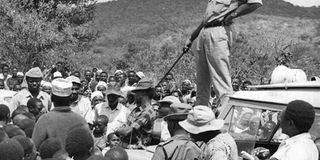Elections in Tanzania: Tanu wins first general election

Mwalimu Julius Nyerere addresses a public rally in this file photo. His decision to urge Tanu to participate in the 1958 polls despite opposition from within enabled the party to lead Tanganyika to independence on December 9, 1961.
Dar es Salaam. Tanzanians who are eligible to vote will get an opportunity to elect leaders of their choice in October this year.
Voters will elect the president, Members of Parliament and ward councilors who will lead them for next five years.
Elections started being held in Tanzania since colonial times. The first General Election were held in 1958/59. Three political parties participated; the Tanganyika African National Union (Tanu), the United Tanganyika Party and the African National Congress.
Tanu under the leadership of Julius Nyerere won the elections resoundingly. The election was held in two phases. The first phase involved five constituencies and was conducted from September 8 and 12, 1958, and in the other five on February 9 and 15, 1959.
Stringent conditions
The colonial government introduced tripartite voting in the 1958/59 polls in which an eligible voter was supposed to vote for a white, Asian and African candidate for the same constituency. Failure to follow this guideline nullified the voter’s ballot.
The colonial government, under Governor Edward Twining, also put other more stringent conditions that, analysts say, were aimed at discoursing both Tanu and voters from participating in the elections.
These include eligible voters to have a minimum annual income of 400 pounds, educated to the level of 12th grade (equivalent to Form Four currently). An eligible voter must have had specific employment.
Tabora conference
Speaking to MCL in Ukerewe recently former Speaker of the National Assembly Pius Msekwa said the conditions to participate in the elections were tough and were aimed at excluding Tanu and the the majority Africans from the elections. In Bagamoyo District, for example, eligible voters were only 630 in a population of 89,000.
Tanu had to convene a special conference in Tabora from January 21 to 26 to deliberate on the election issue. The main agenda was whether Tanu should participate in the elections under those stringent, unfair conditions.
Two main camps emerged during the conference whose push and pull threatened the very survival of the party itself. One camp was that of moderates who wanted Tanu to participate in the elections. And the conservatives who wanted Tanu boycott the elections.
Nyerere, who agreed with the moderates that Tanu should participate in the elections had to put extra efforts to convince delegates why participating in the elections was in Tanu and Tanganyika’s best interests.
Delegates voted in favour of participating in the elections. Soon, however, some of those who wanted Tanu to boycott the elections quit and formed other political parties. Among the delegates were Zuberi Mtemvu, who was Tanu’s Publicity Secretary. He went ahead and formed the African National Congress (ANC) that participated in the 1958 elections.
The elections
Tanu won 28 out of 30 elected seats in the Legislative Council. After the elections Governor Twining was replaced with Richard Turnbull, who had been a colonial officer in Kenya.
During the election Nyerere contested in the East constituency, while Mtemvu contested the elections in the Tanga constituency where he came a distant third with 53 votes.
The winning Tanu candidate John Keto got 3,555 votes. In the Tanga constituency Tanu did not field white and Asian candidates.
Nyerere won the East constituency garnering 2,628 votes against his opponent chief George Kunambi, who got 802 votes.
After Tanu’s elections in the 1958/59 elections the colonial government agreed to the formation of internal self-government that was to be put in place after the 1960 elections. In the 1960 elections Tanu won 70 out of 71 elected Legislative Council seats.
Nyerere became Chief Minister.
The following year, on December 9, 1961, Tanganyika got its independence from Britain and Nyerere became Prime Minister.
In 1962 Tanganyika became a republic and the first presidential elections were held. Nyerere became the flag-bearer of Tanu and won the elections, becoming the first President of the free Tanganyika. Nyerere had resigned from his position as Premier several months before and appointed Rashid Kawawa to replace him. In the November 1962 elections 1.8 million voters registered. Tanu won by 98.15 per cent.
ANC
The Tanganyika African National Congress was established by Mtemvu after he disagreed with Tanu’s decision to participate in the 1958 elections.
Initially the party was denied registration in May 1958. Mtemvu, then, changed the name to African National Congress. The party participated in the first phase of the polls in September 1958. Mtemvu was the sole candidate for the party.
He contested the Tanga constituency where he was trounced by the Tanu candidate, Keto who won with 3,455 votes.
Mtemvu only got 53 votes. After the loss of Mtemvu, ANC did not participate in the second phase of the elections.
Nyerere’s role
As Tanu delegates wen to the Tabora conference it was an open secret that Nyerere wanted the party to participate in the elections.
This was despite the “unacceptable” conditions that the colonial government had set.
Aleck Che-Mponda, the late politician and academic said in an essay that Nyerere’s support for Tanu’s participation in the elections were surprising since he abhorred segregationist behaviours as “evil” and “godless.”
Despite the tough conditions all candidates, whether African, Asian or white, who were supported by Tanu won their seats.
And Tanu went ahead to, eventually, form the new government that culminated with the independence in 1961.
“The point which Nyerere brought forward here is that sometimes by participating and being included you can help bring about the desired changes from within,” Dr Che-Mponda writes.
Dr Che-Mponda draws parallels with Rhodesia where nationalists boycotted the 1961 elections.
The racist Ian Smith emerged victorious and formed a minority government.
“Consequently, the Africans having effectively closed out legitimately had to go underground and emerge in liberation struggles.
“It took bloody 15 years to wrest power from the white minorities through the barrel of the gun and reclaim Zimbabwe,”


